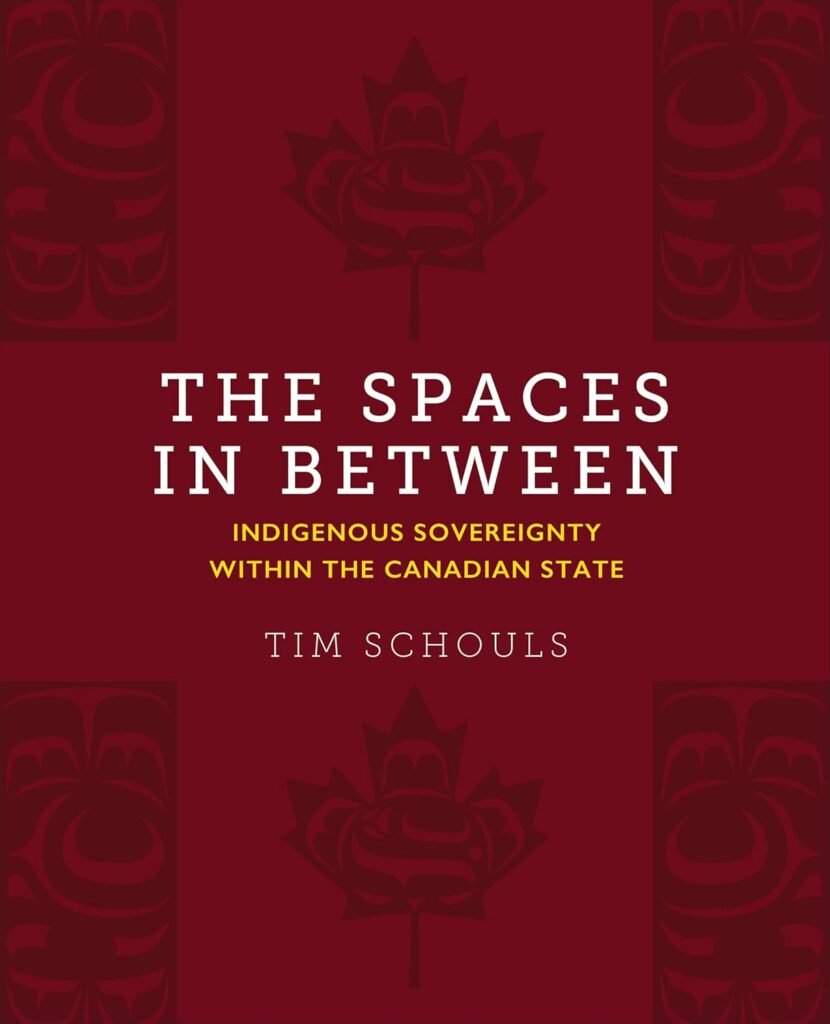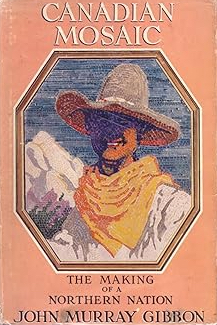‘Redefining the Canadian Mosaic’
The Spaces In Between: Indigenous Sovereignty within the Canadian State
by Tim Schouls
Toronto: University of Toronto Press, 2024
$74.95 / 9781487587406
Reviewed by Linda Rogers
*

In his preface, author Tim Schouls, a non-Indigenous political science scholar, as is required in this time of disputed intentions, makes his own identity transparent and attempts a clear definition of “spaces in between,” what it means to be redefining the Canadian Mosaic, the term of wishful thinking, when Canadians were altruists, colour chips living side by side in assumed mutual respect.
Well, the lid has blown off that can of worms. With the evidence clearly visible and the impact catastrophic, we can no longer hide from the truth, but many still resist, as witnessed by neo-conservative movements. We may not have had race wars like the Hollywood cowboy and Indian movies, but we did roll out a system of laws that disfavoured the vanquished, and it is past time to accept that.
The “Space in Between” is a third solitude, where First Peoples who have reinstated boundaries and rights have room to argue for restoration of their entitlements.

“The debate on Indigenous rights and what those rights demand from the Canadian state is fairly polarized” and Schouls, self-defined as an ally in the struggle for Indigenous sovereignty, attempts in this scholarly but accessible book to draw a map to respect and dignity as opposed to dangerous co-dependencies with tribal councils replacing traditional models of governance at the behest of the state.
What has been most dangerous, he makes clear from the outset, is the colonial model set out in the Indian Act, “He for God only. She for the God in him,” premises set in the poem “Paradise Lost,” by John Milton, who was no fool. Paradise Lost indeed. We all know the outcome of the Indian Act, the potlatch bans, all of it. It was to disenfranchise women, the traditional knowledge keepers, and the result was addiction, family pain, the forced removal, no, let’s call a spade a spade, the criminal kidnapping and murder of children by church and state to make sure they “assimilated” aka became second rate “whites.”
The cumulative effect of these policies led us to conclude that “Indigenous women, who once were autonomous, influential and economically and politically powerful within their nations were transformed into becoming dependent, subservient confined to the domestic sphere in colonial society.”
To destroy the mother is to assault the family. Social breakdown follows family breakdown, but Schouls asserts, the mother and the family are stronger than that, with the will, the infrastructure and the right to resist.
Treaties have been ignored, land has been stolen and desecrated in unethical forest practice, fisheries have been polluted, and children have been denied access to their ancestors, the most sacred of human rights. Schouls, with the respect essential to framing the questions and answers to the old legal question “Quid nunc?” explains to laypersons as well as legislators and scholars what it means to the survival of our combined peoples to have a plan that works with minimal confrontation, solutions from the spaces in between, where sovereign entities negotiate their traditional rights.
“The Space In Between” is a sturdy negotiating position of “nested sovereignty” from which self-determination is peacefully asserted from within respected boundaries.
He argues the ship of state is correcting, “the tight political grip that the Canadian state has held over Indigenous peoples is loosening and has been loosening for several decades,” after pushback, refusal to accept the assertions of a colonial system by the subjected First Nations.

The introduction of elected band councils, as opposed to the traditional counsel of chiefs and elders, introduced the politics of patrimony, which is subject to pressure from business and government, not necessarily in the best interest of the people. Internal conflict has inhibited the real progress of sovereignty and the author carefully articulates strategies for negotiation while supporting traditional procedures.
This book is not a bodice ripper or whodunnit to be consumed in a single sitting but a reasoned strategy which needs to be studied like a book of law or history. The author is careful to use accessible language and his arguments are well organised and spaced so that we might all benefit from understanding the “spaces in between,” where many of our friends and neighbours are waiting to live in harmony, not just with the past, but toward a better life for all of us who share a shrinking planet.
In chapters covering prospects for sovereignty, identity politics, policy, the courts, treaties old and new, self-government, and partnerships, he makes his case for self- actualised democracy. For reference and study, each chapter begins with learning objectives and ends with a conclusion, discussion questions, a bibliography and notes, reconciliation lessons from the heart and mind of an ally. It is a paper classroom.
As First Peoples “continue to expose the immorality of the Canadian state’s presumption to claim totalizing sovereignty” we are given opportunities to listen and learn. This book is one of them.
In clearly laid out chapters from Prospect to Policy to Partnership, Schouls describes the steps taken in many negotiations to articulate the positions of numerous peoples, all with different land claims, cultures, languages, and histories. This distillation of research is the “dummies” guide; he has done the work, and it would serve us all well to devote a little time to understanding what we are standing on, a planet that belongs to no one and everyone. The negotiations are to ensure we do it peacefully, with mutual respect and concern for the wellbeing of generations that will hopefully follow us.
*

Linda Rogers is currently completing a memoir of Chief Tony Hunt, an artist whose triumph and tragedy were the threshold of reconciliation. [Editor’s Note: She has reviewed books by Michelle Good, Marilyn Bowering, Taro Zion Joy, Heather Menzies, Brandi Bird, and Leslie Gentile for The British Columbia Review.]
*
The British Columbia Review
Interim Editors, 2023-25: Trevor Marc Hughes (non-fiction), Brett Josef Grubisic (fiction and poetry)
Publisher: Richard Mackie
Formerly The Ormsby Review, The British Columbia Review is an online book review and journal service for BC writers and readers. The Advisory Board now consists of Jean Barman, Wade Davis, Robin Fisher, Barry Gough, Hugh Johnston, Kathy Mezei, Patricia Roy, Maria Tippett, and Graeme Wynn. Provincial Government Patron (since September 2018): Creative BC. Honorary Patron: Yosef Wosk. Scholarly Patron: SFU Graduate Liberal Studies. The British Columbia Review was founded in 2016 by Richard Mackie and Alan Twigg.
“Only connect.” – E.M. Forster
2 comments on “‘Redefining the Canadian Mosaic’”